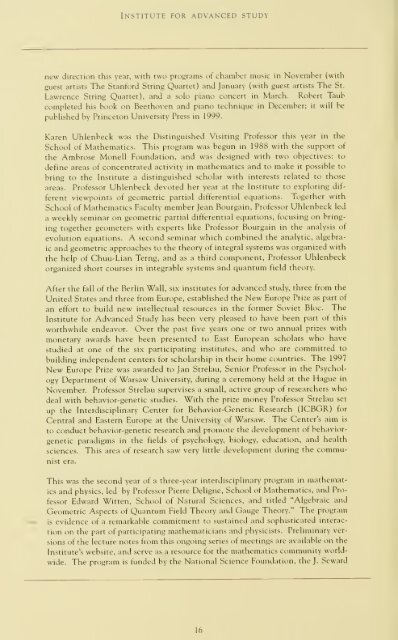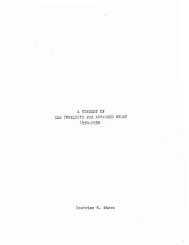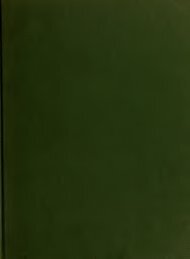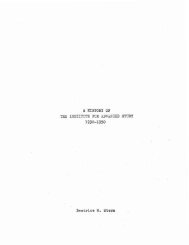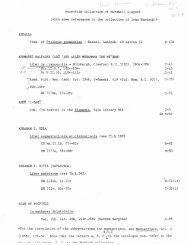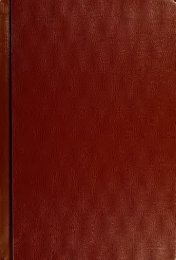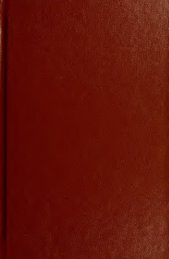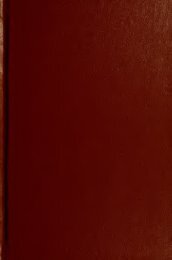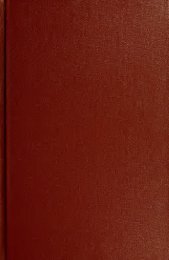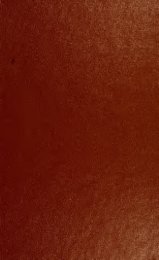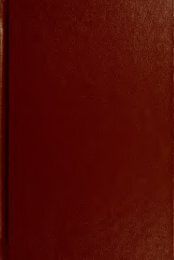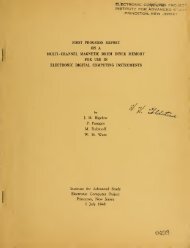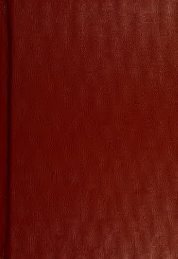Report for the academic year 1998 - The Institute Libraries - Institute ...
Report for the academic year 1998 - The Institute Libraries - Institute ...
Report for the academic year 1998 - The Institute Libraries - Institute ...
Create successful ePaper yourself
Turn your PDF publications into a flip-book with our unique Google optimized e-Paper software.
<strong>Institute</strong> <strong>for</strong> advanced study<br />
new direction this <strong>year</strong>, with two programs of chamber music in November (with<br />
guest artists <strong>The</strong> Stan<strong>for</strong>d String Quartet) and January (with guest artists <strong>The</strong> St.<br />
Lawrence String Quartet), and a solo piano concert in March. Robert Taub<br />
completed his book on Beethoven and piano technique in December; it will be<br />
published by Princeton University Press in 1999.<br />
Karen Uhlenbeck was <strong>the</strong> Distinguished Visiting Professor this <strong>year</strong> in <strong>the</strong><br />
School of Ma<strong>the</strong>matics. This program was begun in 1988 with <strong>the</strong> support of<br />
<strong>the</strong> Ambrose Monell Foundation, and was designed with two objectives: to<br />
define areas of concentrated activity in ma<strong>the</strong>matics and to make it possible to<br />
bring to <strong>the</strong> <strong>Institute</strong> a distinguished scholar with interests related to those<br />
areas. Professor Uhlenbeck devoted her <strong>year</strong> at <strong>the</strong> <strong>Institute</strong> to exploring dif-<br />
ferent viewpoints of geometric partial differential equations. Toge<strong>the</strong>r with<br />
School of Ma<strong>the</strong>matics Faculty member Jean Bourgain, Professor Uhlenbeck led<br />
a weekly seminar on geometric partial differential equations, focusing on bring-<br />
ing toge<strong>the</strong>r geometers with experts like Professor Bourgain in <strong>the</strong> analysis of<br />
evolution equations. A second seminar which combined <strong>the</strong> analytic, algebra-<br />
ic and geometric approaches to <strong>the</strong> <strong>the</strong>ory of integral systems was organized with<br />
<strong>the</strong> help of Chuu-Lian Terng, and as a third component, Professor Uhlenbeck<br />
organized short courses in integrable systems and quantum field <strong>the</strong>ory.<br />
After <strong>the</strong> fall of <strong>the</strong> Berlin Wall, six institutes <strong>for</strong> advanced study, three from <strong>the</strong><br />
United States and three from Europe, established <strong>the</strong> New Europe Prize as part of<br />
an ef<strong>for</strong>t to build new intellectual resources in <strong>the</strong> <strong>for</strong>mer Soviet Bloc. <strong>The</strong><br />
<strong>Institute</strong> <strong>for</strong> Advanced Study has been very pleased to have been part of this<br />
worthwhile endeavor. Over <strong>the</strong> past five <strong>year</strong>s one or two annual prizes with<br />
monetary awards have been presented to East European scholars who have<br />
studied at one of <strong>the</strong> six participating institutes, and who are committed to<br />
building independent centers <strong>for</strong> scholarship in <strong>the</strong>ir home countries. <strong>The</strong> 1997<br />
New Europe Prize was awarded to Jan Strelau, Senior Professor in <strong>the</strong> Psychology<br />
Department of Warsaw University, during a ceremony held at <strong>the</strong> Hague in<br />
November. Professor Strelau supervises a small, active group of researchers who<br />
deal with behavior-genetic studies. With <strong>the</strong> prize money Professor Strelau set<br />
up <strong>the</strong> Interdisciplinary Center <strong>for</strong> Behavior-Genetic Research (ICBGR) <strong>for</strong><br />
Central and Eastern Europe at <strong>the</strong> University of Warsaw. <strong>The</strong> Center's aim is<br />
to conduct behavior-genetic research and promote <strong>the</strong> development of behavior-<br />
genetic paradigms in <strong>the</strong> fields of psychology, biology, education, and health<br />
sciences. This area of research saw very little development during <strong>the</strong> commu-<br />
nist era.<br />
This was <strong>the</strong> second <strong>year</strong> of a three-<strong>year</strong> interdisciplinary program in mathL-mat-<br />
ics and physics, led by Professor Pierre Deligne, School of Ma<strong>the</strong>matics, and Professor<br />
Edward Witten, School of Natural Sciences, and titled "Algebraic and<br />
Geometric Aspects of Quantum Field <strong>The</strong>ory and Gauge <strong>The</strong>ory." <strong>The</strong> program<br />
is evidence of a remarkable commitment to sustained and sophisticated interac-<br />
tion on <strong>the</strong> part of participating ma<strong>the</strong>maticians and physicists. Preliminary ver-<br />
sions of <strong>the</strong> lecture notes from this ongoing series of meetings are available on <strong>the</strong><br />
<strong>Institute</strong>'s website, and serve as a resource <strong>for</strong> <strong>the</strong> ma<strong>the</strong>matics community worldwide.<br />
<strong>The</strong> program is funded by <strong>the</strong> National Science Foundation, <strong>the</strong> J. Seward<br />
16


